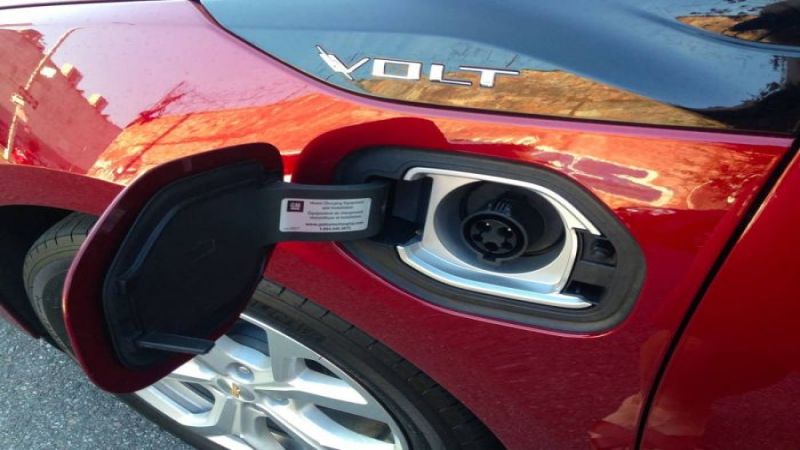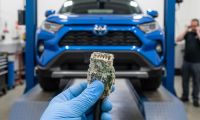Daniel Hamilton comments on the charging cost of Tesla Model 3 vs Chevy Volt in the GM Electric Vehicle Owners group on Facebook.
I have owned and driven both a Volt AND a Model 3. Here is how much it costs to charge an electric car at home and at a public station.
My lifetime average is 4.5 miles per kWh in the Model 3. Here in Illinois the Supercharger rates are $0.24/kWh.
Assuming I charge the Model 3 at home at a price of $0.13 per kWh before leaving on a "long trip", that works out to $0.029 per mile for the first 210 miles followed by $0.053 per mile for the remaining miles.
I tracked my average as 4.2 miles per kWh in the Chevy Volt, and then I got 41 MPG on the gasoline engine after that.
Premium gasoline in Illinois is currently approximately $3.399 per gallon.
Assuming I charge the Volt at home at a price of $0.13 per kWh before leaving on a "long trip", that works out to $0.031 for the first 53 miles followed by $0.083 per mile for the remaining miles.
Lets look at a 1000 mile trip:
- Telsa Model 3: $6.09 for the first 210 miles plus $41.87 for the remaining 790 miles = $47.96.
- Chevy Volt: $1.64 for the first 53 miles plus $78.60 for the remaining 947 miles = $80.24.
That's an extra $32.28 in the Chevy Volt.
Which vehicle will bite your wallet if you decide to take a long distance trip with it and have to use commercial stations?
Also see: Will Public Electric Car Charging Become More Expensive Than Gas? Please share your thoughts about this math int he comments section below. Regarding the EV charging infrastructure: it's time for single standard connector.
Set Torque News as Preferred Source on Google












Comments
The new Chevy Volt doesn’t
Permalink
The new Chevy Volt doesn’t use premium gas and won’t be broken down 2 months a year. I ordered a Tesa Model X. Not sure they’ll approve the loan which will cost me $2500 dollars.
I now average 75 MPGcs on my
Permalink
I now average 75 MPGcs on my Volt by turning on the engine at freeway. I get 101 MPGcs if I hypermile. I can get 200 miles to a charge on my Chevy Volt, but normally only between 65-70 miles to a charge. My lifetime MPGe with my Chevy Volt after 50,000 miles is 120 and that includes using gasoline, which is not significantly different than that of Tesla Model 3. My off-peak rates at home is $0.13/kWH, the Tesla Supercharging stations here costs $0.26/kWH plus tax, and the CostCo gas is $3.199 per gallon . Would you mind to do the numbers for me?
I have a 2015 Volt. I'd love
Permalink
In reply to I now average 75 MPGcs on my by Joe (not verified)
I have a 2015 Volt. I'd love to better understand what you do when 'hyper-mile' I have my own 220v charge station so I start my day fully juiced. Most days I don't use gas. I'm most curious to know what you do to get the best MPG on the highway. The highways I use have a 70 MPH speed limit and because its sauna hot here in Florida, on most days AC is a must. Looking forward to your feedback.
Take a Chevy Bolt and plug-in
Permalink
Take a Chevy Bolt and plug-in to a commercial charging station. You're in denial and living in your own world if you haven't looked around at the electricity rates from various Charging stations. Over here at nearby Walgreens, they charge about $1.00/kWH
I don't follow your revised
Permalink
In reply to Take a Chevy Bolt and plug-in by Joe (not verified)
I don't follow your revised comparison. Daniel has shown in absolute terms that the cost of long travel in the Tesla is cheaper. I agree with him. I have a Tesla and an ELR and have confirmed this is the case. Even on trips as short as 90 miles, the Tesla wins in efficiency.
The powertrain in the Tesla and Voltec are similar in terms of efficiency until the Voltec switches over to gas. At this point MPG starts to drop quickly. My lifetime MPG in the ELR is 109MPG. This isn't my first rodeo.
The real trick as you figured out is to switch over to gas on the freeway. It let's the coolant temperatures rise to the best operating temperatures, maintain constant RPM and lock the clutch to the wheels (see engineering demonstration videos on YouTube) for an added efficiency bump. Once you are in stop and go traffic, switch back to touring mode and let the EV powertrain handle the stop and go. This assumes that your trip is longer than your EV range. If your trip is shorter then just stay on EV mode, of course.
The author's reasoning doesn
Permalink
The author's reasoning doesn't hold water in the real world in my opinion:
1. As someone else mentioned, the second generation Volt doesn't require premium gasoline. Regular 87 octane works just fine.
2. A Tesla driver will likely have to go out of his way to find a charging station, while a Volt driver can stop at any gas station. So, the 1000 miles it takes for a Tesla driver to go from point A to point B might only be 950 miles for a Volt driver.
3. The time it takes to fill up with gas is much shorter than the time it takes to charge a Tesla.
Taking these factors into consideration, and using regular gas, the $15 or so more it would take to drive a Volt on this imaginary trip is worth the time savings and less mileage in my book.
Article fails to consider the
Permalink
Article fails to consider the hassle of recharging the Tesla. Even the 310 mi range Model 3 would require 2 hrs at a SuperCharger to drive 1000 mi, so add the value of your time (and all passengers). That assumes you can map a path w/ SC's and don't go far out of the way. If relying on regular chargers, the only recharge at 30 mile range/hr, so recharge while sleeping or plan to travel at 20 mph on average. The Volt can live off gas stations which are everywhere. I have enough trouble finding diesel, so would hate to rely on SC's.
Such a Telsa fanboi..
Permalink
Such a Telsa fanboi..
Model 3 doesn't achieve EPA ratings for one. You use the worst fuel scenario for the Volt assume on the highway you will achieve the best usage of kwh while doing 70+. You also fail to consider the time required vs the two....While the Volt driver is relaxing at the end of the trip in the same day, you get to watch Netflix while at a charger! Bravo you